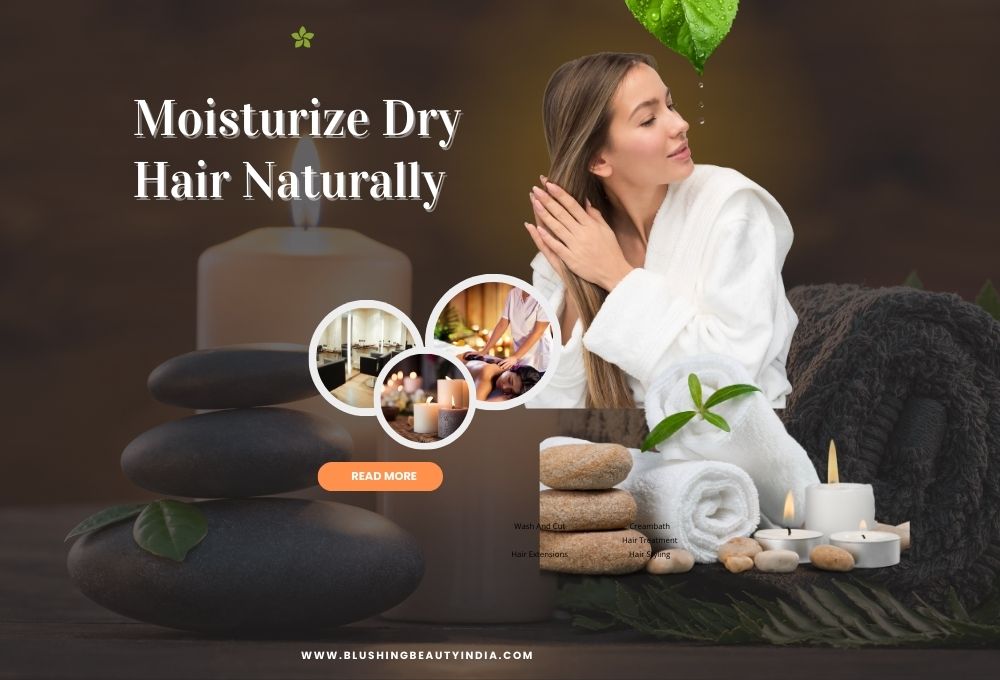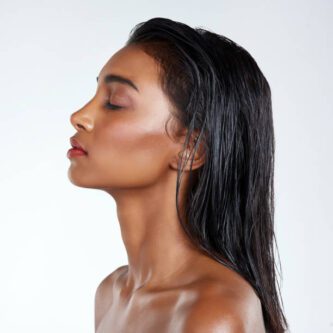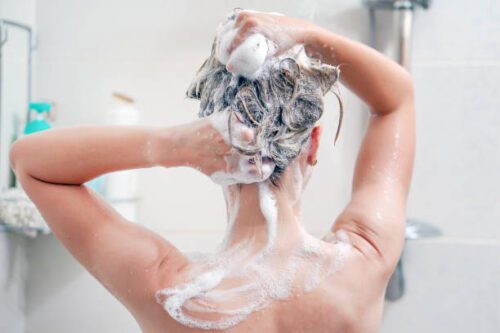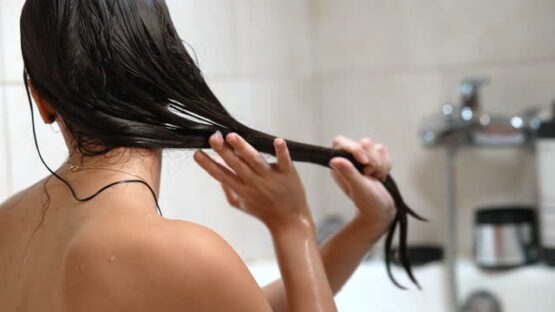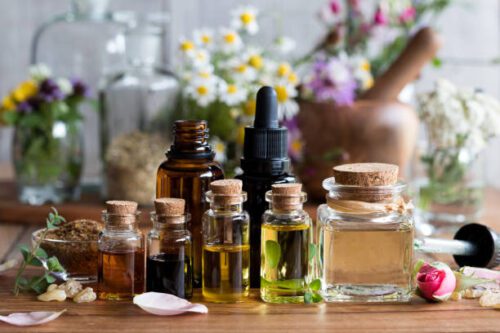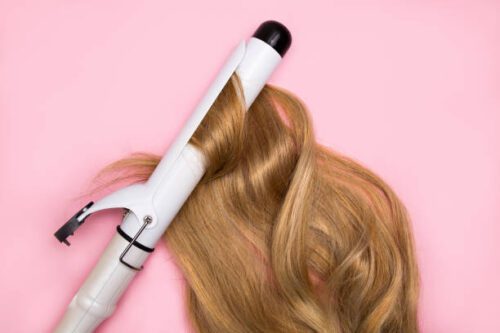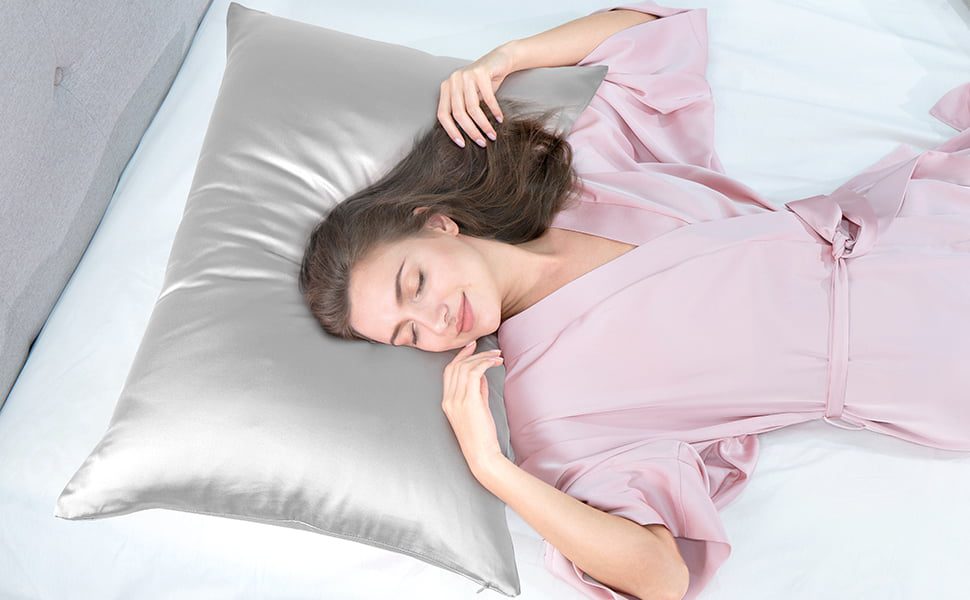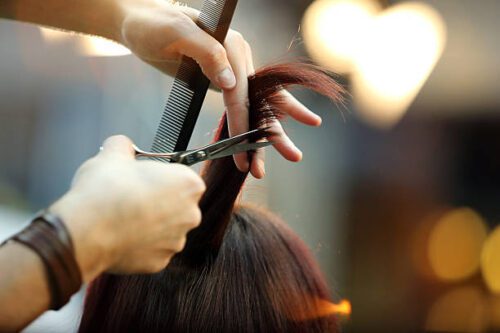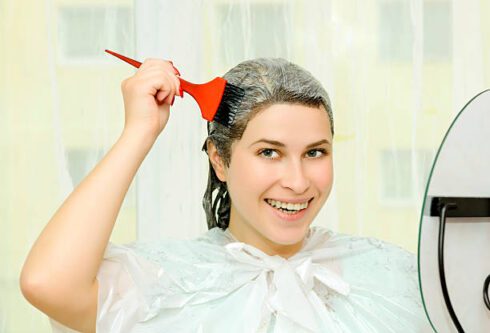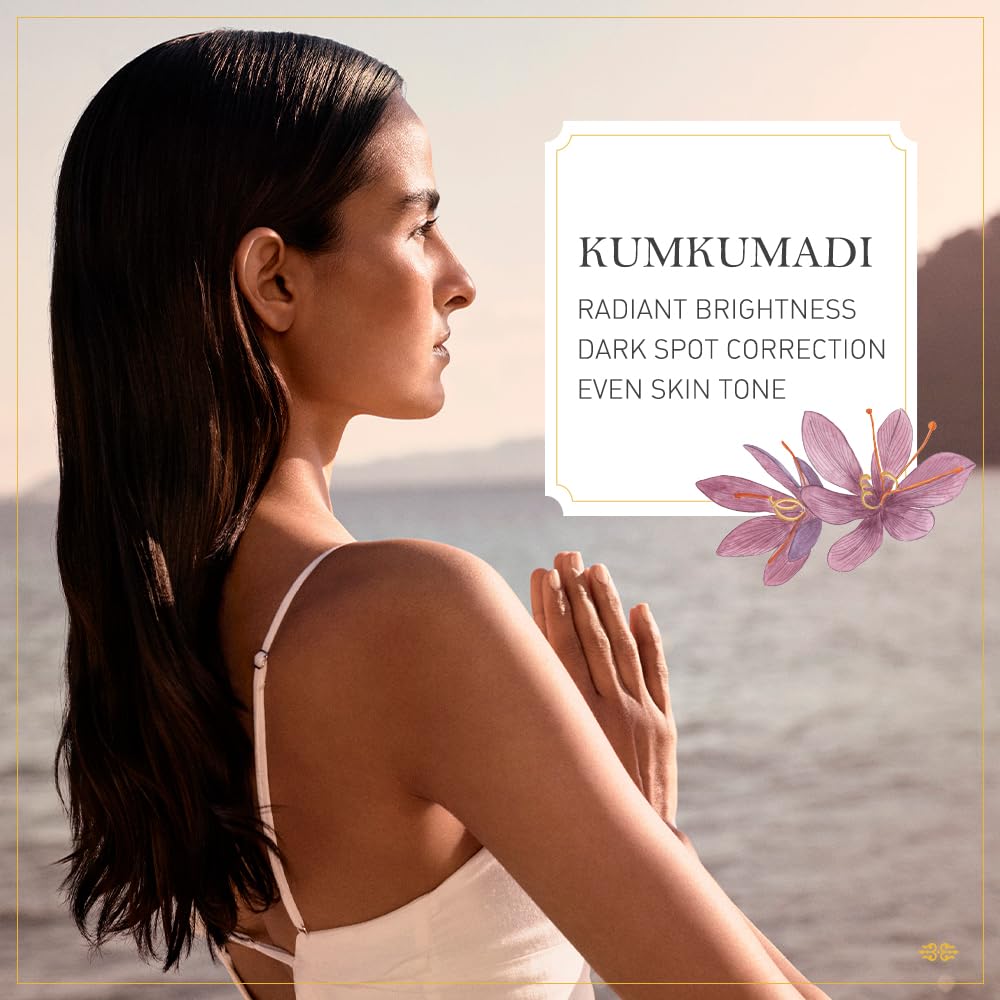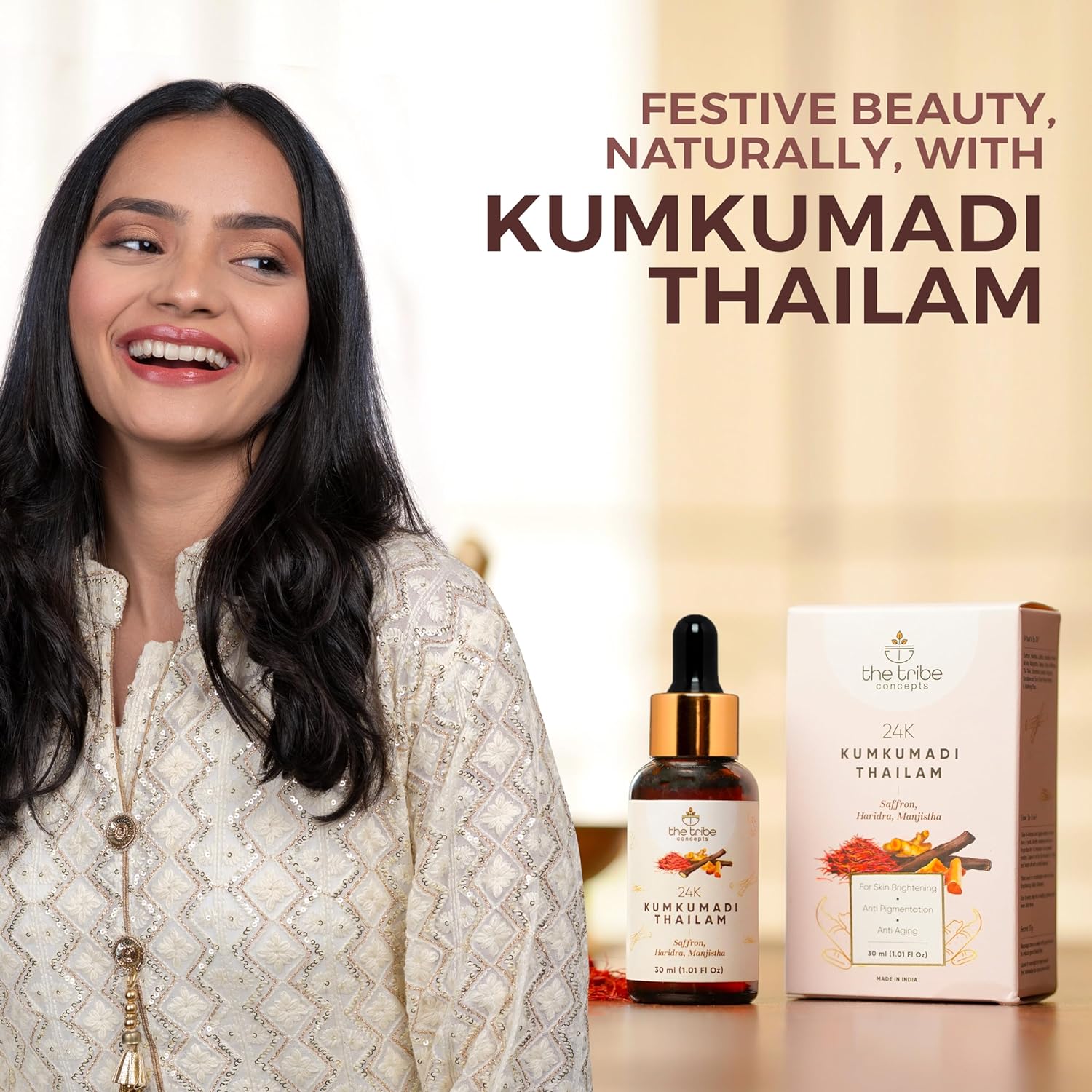Moisturize Dry Hair Naturally Dry hair can be a nightmare to deal with. It can lead to frizz, breakage, and an overall lackluster appearance. But fear not, for we have the key to unlock the secrets of moisturizing your dry hair naturally. Say goodbye to those bad hair days and hello to luscious, hydrated locks. In this comprehensive guide, we’ll delve into ten effective ways to restore moisture to your hair and keep it looking its best.
1. Hydrate from the Inside Out
When it comes to maintaining healthy, well-moisturized hair, we often focus on external treatments such as conditioners and oils. However, one of the most fundamental aspects of hair health is often overlooked, and that is internal hydration.
Water is the elixir of life, and this applies to your hair as well. Our bodies are composed of approximately 60% water, and every cell in our body requires water to function optimally. This includes the cells in your scalp, which are responsible for hair growth and health.
So, how does internal hydration affect your hair? Here’s how:-
1. Scalp Health
A well-hydrated body means a well-hydrated scalp. When your scalp is adequately moisturized, it’s in the best condition to support healthy hair growth. Dehydration can lead to a dry, flaky scalp, which can hinder the growth of new hair.
2. Hair Elasticity
Dehydrated hair is brittle and lacks elasticity. It’s more prone to breakage and split ends. Drinking enough water ensures that your hair maintains its elasticity and strength, reducing the risk of damage.
3. Natural Oil Production
Your scalp produces natural oils called sebum. These oils keep your hair soft and shiny while preventing it from becoming overly dry. Dehydration can disrupt sebum production, leaving your hair dry and prone to frizz.
4. Hair Thickness and Growth
When you’re well-hydrated, your body can transport essential nutrients to your hair follicles efficiently. This nourishment promotes hair growth and can lead to thicker, healthier hair.
5. Preventing Hair Loss
Dehydration can lead to hair loss. Hair follicles require a constant supply of water and nutrients to maintain their function. When deprived of these essentials, they may become dormant, leading to hair thinning and even hair loss.
How to Stay Hydrated for Healthy Hair
- Drink Enough Water: The recommended daily water intake varies for each individual, but a general guideline is to aim for at least 8 glasses (64 ounces) of water per day. Adjust your intake based on your activity level, climate, and personal needs.
- Balanced Diet: Consume a diet rich in fruits and vegetables, as they contain a high water content. These foods not only provide hydration but also essential vitamins and minerals that benefit your hair.
- Limit Dehydrating Beverages: Reduce your consumption of dehydrating beverages such as caffeinated drinks and alcohol. They can contribute to dehydration if consumed in excess.
- Monitor Your Urine: A simple way to check your hydration level is to monitor the color of your urine. Clear or pale yellow urine usually indicates good hydration.
- Use a Humidifier: If you live in a dry climate or spend a lot of time in air-conditioned environments, using a humidifier can help maintain moisture levels, not just for your hair but for your skin as well.
2. Gentle Shampooing
- Choosing the right shampoo is a critical aspect of any hair care routine, especially when you’re aiming to moisturize dry hair naturally. Shampoo plays a pivotal role in cleansing your hair and scalp while also having a significant impact on the moisture balance of your locks.
Here’s why gentle shampooing is so important:
1. Avoid Harsh Ingredients
Many shampoos on the market contain harsh ingredients, such as sulfates. These chemicals are effective at removing dirt and oil but can be detrimental to dry hair. Sulfates strip away your hair’s natural oils, leaving it even drier. Look for sulfate-free shampoos that offer a gentler cleansing experience.
2. Retain Natural Oils
Your scalp produces natural oils called sebum, which are essential for keeping your hair soft and moisturized. Gentle shampoos are designed to cleanse your hair without completely stripping it of these oils. This is crucial for maintaining the natural moisture balance of your hair.
3. Prevent Further Drying
Using a harsh shampoo, especially on already dry hair, can exacerbate the problem. Your hair will become more prone to breakage, split ends, and frizz. Gentle shampoos, on the other hand, cleanse effectively without causing additional damage.
4. Enhance Manageability
Dry hair is often difficult to manage, and it can become unruly and tangled. A gentle shampoo can help maintain the softness and manageability of your hair, making it easier to style and maintain.
How to Choose a Gentle Shampoo
When selecting a gentle shampoo for your hair, keep the following tips in mind:
- Read Labels: Look for shampoos that explicitly state they are sulfate-free or designed for dry and damaged hair. These formulations are typically milder and more suitable for your needs.
- Avoid Overuse: You don’t need to shampoo your hair every day. In fact, washing your hair too frequently can strip it of natural oils. Aim to shampoo every 2-3 days, or as needed.
- Consider Your Hair Type: Different hair types require different shampoos. If you have curly hair, for example, opt for a shampoo specifically designed for curly or wavy hair to cater to its unique needs.
- Use a Hydrating Conditioner: After shampooing, be sure to follow up with a hydrating conditioner. This step locks in moisture and prevents dryness.
- Look for Natural Ingredients: Some shampoos are formulated with natural ingredients like aloe vera or coconut oil, which can be particularly nourishing for dry hair.
3. Conditioning is Key
- Conditioners form a protective layer on your hair, which can shield it from environmental damage such as UV rays, pollution, and harsh weather conditions. This protection is essential for maintaining your hair’s health and moisture.
Choosing the Right Conditioner - Selecting the right conditioner for your hair is crucial. Here’s how to make an informed choice:
- Match Your Hair Type: Look for a conditioner that matches your specific hair type. There are conditioners designed for straight hair, curly hair, fine hair, and more. Using a conditioner tailored to your hair type ensures the best results.
- Consider Ingredients: Read the label and opt for conditioners with nourishing ingredients like shea butter, coconut oil, or argan oil. These natural components provide excellent moisture and hydration.
- Focus on Ends: When applying conditioner, concentrate on the mid-length to the tips of your hair. These areas tend to be drier and more prone to damage. Applying conditioner to your scalp can make it greasy and weigh down your hair.
- Rinse Properly: Ensure you rinse the conditioner thoroughly from your hair. Leaving residue can make your hair appear dull and greasy.
- Use a Weekly Deep Conditioner: In addition to your regular conditioner, consider using a deep conditioner or hair mask once a week for an extra boost of moisture and repair.
4. Natural Oils for Nourishment
- When it comes to naturally moisturizing dry hair, few things work as effectively as natural oils. These oils have been used for centuries to promote healthy hair, and for a good reason. They are packed with vitamins, antioxidants, and essential fatty acids that can nourish, hydrate, and transform your hair. Let’s take a closer look at some of the most popular natural oils for hair nourishment:
1. Coconut Oil
Coconut oil is a superstar when it comes to hair care. It’s rich in lauric acid, which has a high affinity for hair proteins. This makes it an excellent choice for deep conditioning. Coconut oil penetrates the hair shaft, nourishing it from within, and forms a protective barrier on the outside, preventing moisture loss. It’s ideal for softening and hydrating dry, frizzy hair.
2. Argan Oil
Argan oil, often referred to as “liquid gold,” is derived from the kernels of the Moroccan argan tree. It’s packed with vitamin E and fatty acids, which make it a potent moisturizer. Argan oil is lightweight and non-greasy, making it perfect for all hair types. It adds shine, reduces frizz, and provides intense hydration to dry hair.
3. Olive Oil
Olive oil isn’t just for the kitchen; it’s also a fantastic natural hair moisturizer. It’s rich in monounsaturated fats and vitamin E, which can help repair and strengthen dry, damaged hair. Olive oil can be used as a pre-shampoo treatment or as a leave-in conditioner to improve hair’s softness and manageability.
4. Jojoba Oil
Jojoba oil is a liquid wax derived from the jojoba plant. It’s remarkably similar to the natural oils produced by our scalp. This makes it an excellent choice for balancing oil production and moisturizing the hair and scalp. Jojoba oil is known for its ability to prevent hair breakage and support overall hair health.
5. Avocado Oil
Avocado oil is rich in monounsaturated fats and vitamin E. It’s an excellent choice for deep conditioning and moisturizing dry, brittle hair. Avocado oil penetrates the hair shaft, making it softer and more manageable. It’s particularly beneficial for curly or textured hair.
How to Use Natural Oils for Hair
When using natural oils for hair nourishment, it’s essential to apply them correctly:
- Choose the Right Oil: Select the oil that best suits your hair type and needs. Each oil has unique properties, so consider your hair’s specific requirements.
- Heat and Apply: Heat the oil slightly and then apply it to your hair. This helps the oil penetrate the hair shaft more effectively. Be sure to concentrate on the ends, which are often the driest.
- Massage In: Gently massage the oil into your hair and scalp. This improves circulation and ensures even distribution.
- Leave-In or Rinse Out: Depending on your preference, you can leave the oil in for a few hours or overnight and then wash it out, or you can use it as a leave-in conditioner for added moisture.
- Consistency Is Key: To see long-term benefits, use natural oils regularly, but don’t overdo it. Once a week or every two weeks is usually sufficient.
5. Avoid Excessive Heat Styling
- Excessive heat styling is a common culprit when it comes to dry, damaged hair. Curling irons, straighteners, and hairdryers, while convenient for achieving various styles, can take a toll on your hair’s moisture levels. Here’s why it’s crucial to limit your use of these tools:
1. Heat Damages Hair Structure
Excessive heat styling can alter the structure of your hair. When you apply high temperatures to your hair, it weakens the protein bonds, causing it to become more prone to breakage and dryness. Over time, this can lead to brittle and lifeless locks.
2. Moisture Loss
High heat can strip your hair of its natural moisture. The intense heat causes the water molecules inside your hair shaft to evaporate rapidly, leaving it parched and dehydrated. This can result in frizz, split ends, and overall dryness.
3. Weakened Cuticle
The outermost layer of your hair, called the cuticle, is a protective barrier. Heat styling can cause the cuticle to lift, making your hair more vulnerable to environmental damage. This can further exacerbate the loss of moisture and lead to a lackluster appearance.
4. Hair Discoloration
Excessive heat can alter the color of your hair, particularly if you use heated tools frequently. This can lead to fading or a change in your hair’s natural shade.
5. Heat Damage is Cumulative
Heat damage is cumulative, which means the more you use heated styling tools without proper protection, the worse the condition of your hair becomes. Preventing damage is easier than repairing it.
How to Protect Your Hair from Heat Damage
While it’s challenging to entirely avoid heat styling, there are measures you can take to minimize the damage and retain moisture in your hair:
- Use Heat Protectants: Always apply a heat protectant product before using heated styling tools. These products create a protective barrier between your hair and the heat source, reducing the risk of damage.
- Lower Heat Settings: Use the lowest effective heat setting on your styling tools. High heat is not always necessary, and reducing the temperature can lessen the risk of damage.
- Limit Frequency: Avoid using heated tools daily. Try to embrace your hair’s natural texture whenever possible and reserve heat styling for special occasions.
- Air Dry: Allow your hair to air dry as often as possible. If you need to use a hairdryer, opt for a cool or warm setting instead of hot.
- Invest in Quality Tools: High-quality styling tools with advanced technology can help distribute heat more evenly, reducing the potential for damage.
- Regular Trims: Regular trims help remove damaged ends, promoting healthier, well-moisturized hair.
6. Silk Pillowcases for Reduced Friction
- When it comes to maintaining well-moisturized hair, the fabric of your pillowcase might not be the first thing that comes to mind. However, it can play a significant role in preserving your hair’s moisture and preventing damage. Silk pillowcases, in particular, offer several advantages for hair health:
1. Reduced Friction
- One of the primary benefits of silk pillowcases is their reduced friction compared to traditional cotton or polyester pillowcases. When your hair rubs against a rough surface, it can lead to frizz, tangles, and breakage. Silk, on the other hand, is incredibly smooth and soft, minimizing friction. This results in less damage to your hair, helping it retain moisture and remain well-hydrated.
2. Less Absorption of Moisture
- Silk is a natural, breathable fabric that doesn’t absorb moisture as readily as cotton. When you sleep on a silk pillowcase, it helps your hair maintain its natural oils and moisture. In contrast, cotton pillowcases can absorb the oils from your hair, leaving it drier and more prone to damage.
3. Gentle on Hair Strands
- Silk pillowcases are gentle on your hair strands. They allow your hair to glide smoothly across the surface, preventing friction-related damage. This is especially beneficial if you have delicate or dry hair that is susceptible to breakage.
4. Preserving Hairstyles
- If you’ve spent time and effort styling your hair, silk pillowcases can help preserve your hairstyle for longer. Your hair is less likely to get flattened or mussed when you sleep on silk, ensuring that your hairstyle remains intact.
Reducing Bed Head
- Friction from traditional pillowcases can create bed head or leave your hair looking unruly in the morning. Silk pillowcases can help reduce these issues, allowing you to wake up with smoother, more manageable hair.
How to Incorporate Silk Pillowcases into Your Routine
- If you’re interested in enjoying the benefits of silk pillowcases for healthier, hydrated hair, consider the following tips:
- Choose High-Quality Silk: Opt for 100% mulberry silk pillowcases for the best results. These are soft, durable, and gentle on your hair.
- Regular Cleaning: Keep your silk pillowcases clean to prevent oil and product buildup. Follow the care instructions provided with your pillowcases for proper maintenance.
- Travel-Friendly: Consider investing in a travel-size silk pillowcase to maintain the health of your hair when you’re away from home.
7. Regular Trimming
- When it comes to maintaining well-moisturized hair, the fabric of your pillowcase might not be the first thing that comes to mind. However, it can play a significant role in preserving your hair’s moisture and preventing damage. Silk pillowcases, in particular, offer several advantages for hair health:
1. Reduced Friction
One of the primary benefits of silk pillowcases is their reduced friction compared to traditional cotton or polyester pillowcases. When your hair rubs against a rough surface, it can lead to frizz, tangles, and breakage. Silk, on the other hand, is incredibly smooth and soft, minimizing friction. This results in less damage to your hair, helping it retain moisture and remain well-hydrated.
2. Less Absorption of Moisture
Silk is a natural, breathable fabric that doesn’t absorb moisture as readily as cotton. When you sleep on a silk pillowcase, it helps your hair maintain its natural oils and moisture. In contrast, cotton pillowcases can absorb the oils from your hair, leaving it drier and more prone to damage.
3. Gentle on Hair Strands
Silk pillowcases are gentle on your hair strands. They allow your hair to glide smoothly across the surface, preventing friction-related damage. This is especially beneficial if you have delicate or dry hair that is susceptible to breakage.
4. Preserving Hairstyles
If you’ve spent time and effort styling your hair, silk pillowcases can help preserve your hairstyle for longer. Your hair is less likely to get flattened or mussed when you sleep on silk, ensuring that your hairstyle remains intact.
Reducing Bed Head
Friction from traditional pillowcases can create bed head or leave your hair looking unruly in the morning. Silk pillowcases can help reduce these issues, allowing you to wake up with smoother, more manageable hair.
How to Incorporate Silk Pillowcases into Your Routine
If you’re interested in enjoying the benefits of silk pillowcases for healthier, hydrated hair, consider the following tips:
Choose High-Quality Silk: Opt for 100% mulberry silk pillowcases for the best results. These are soft, durable, and gentle on your hair.
Regular Cleaning: Keep your silk pillowcases clean to prevent oil and product buildup. Follow the care instructions provided with your pillowcases for proper maintenance.
Travel-Friendly: Consider investing in a travel-size silk pillowcase to maintain the health of your hair when you’re away from home.
8. Hair Masks for Deep Hydration
Hair masks are like a spa day for your hair. They’re intensive treatments that provide deep hydration, repair, and nourishment to combat the dryness that can make your hair appear lifeless and brittle. Here’s why incorporating hair masks into your routine is essential for maintaining well-moisturized hair:
1. Intensive Moisture Boost
Hair masks are formulated with potent ingredients that can provide a surge of moisture to your hair. They often contain deeply hydrating components like natural oils, butters, and conditioning agents that penetrate the hair shaft, leaving it exceptionally soft and hydrated.
2. Repair and Strengthen
Dry hair is often prone to damage and breakage. Hair masks can help repair and strengthen your hair by replenishing lost nutrients and proteins. This not only enhances moisture but also fortifies your hair against future damage.
3. Improved Elasticity
One of the signs of well-hydrated hair is its elasticity. Dry hair can become rigid and prone to snapping, while hydrated hair retains its flexibility and resiliency. Hair masks can improve your hair’s elasticity, making it less likely to break or develop split ends.
4. Taming Frizz and Flyaways
Dry hair is notorious for frizz and flyaways. Hair masks can help to smooth the hair cuticle, reducing frizz and making your hair more manageable.
5. Enhancing Shine
When your hair is adequately moisturized, it reflects light better and appears shinier. Hair masks can boost your hair’s natural shine, leaving it looking healthier and more vibrant.
How to Use Hair Masks
To maximize the benefits of hair masks for deep hydration, follow these steps:
- Choose the Right Mask: Select a hair mask that suits your hair type and specific needs. Look for ingredients like shea butter, avocado oil, or argan oil for deep hydration.
- Cleanse Your Hair: Begin with clean, wet hair. Shampoo your hair as you normally would, and then gently squeeze out excess water with a towel.
- Apply the Mask: Use your fingers to apply the mask generously, starting from the mid-length to the tips of your hair. Avoid the scalp, as applying a mask there can make your hair greasy.
- Time It Right: Check the product’s instructions for the recommended duration. Most masks are left on for 5-20 minutes. Some can even be left on overnight for an extra hydrating boost.
- Rinse and Style: After the recommended time, thoroughly rinse out the mask with cool water. Style your hair as usual, and enjoy the benefits of your deeply hydrated locks.
9. Balanced Diet
- The saying “you are what you eat” holds true when it comes to your hair’s health. What you consume has a profound impact on the condition and hydration of your locks. To ensure that your hair is well-moisturized and radiant, consider the following dietary guidelines:
1. Protein for Strength
Proteins are the building blocks of hair, composed mainly of a protein called keratin. To maintain strong and well-hydrated hair, ensure your diet includes sources of lean protein, such as poultry, fish, lean meats, eggs, and plant-based sources like tofu and legumes.
2. Healthy Fats for Moisture
Essential fatty acids, particularly omega-3 and omega-6 fatty acids, are crucial for hair health. These fats help maintain the natural oils that keep your hair hydrated. Include foods like fatty fish (salmon, mackerel), avocados, nuts, and seeds in your diet to provide these essential nutrients.
3. Vitamins and Minerals for Growth
Vitamins and minerals play a vital role in hair growth and moisture. Biotin, vitamins A, C, D, and E, as well as minerals like iron and zinc, are essential for your hair’s health. Incorporate a variety of fruits, vegetables, and whole grains into your diet to ensure you’re getting a broad spectrum of these nutrients.
4. Hydration with Water
Staying well-hydrated is not just essential for your body but for your hair as well. Dehydration can lead to dry and brittle hair. Aim to drink at least 8 glasses (64 ounces) of water daily to keep your hair and body properly hydrated.
5. Antioxidants for Protection
Antioxidant-rich foods can protect your hair from damage caused by free radicals. These molecules can harm your hair’s cellular structure, leading to dryness and dullness. Include berries, citrus fruits, and leafy greens in your diet to boost your antioxidant intake.
6. Collagen for Elasticity
Collagen, a protein that plays a role in the structure of hair, can enhance its elasticity and moisture. Collagen can be found in bone broth and supplements. Including collagen-rich foods in your diet can help maintain your hair’s vitality.
Limit Sugar and Processed Foods
High sugar intake can lead to inflammation, which can negatively affect your hair’s moisture and health. Additionally, processed foods often lack the nutrients necessary for healthy hair. Limit your consumption of sugary and processed items.
Balanced Diet Tips for Hair Health
Here are some practical tips to maintain a balanced diet for well-hydrated hair:
- Variety is Key: Consume a wide range of foods to ensure you’re getting a diverse array of nutrients. This helps support overall hair health.
- Supplements: If you struggle to meet your nutritional needs through your diet alone, consider supplements. Consult with a healthcare professional to determine which supplements are right for you.
- Avoid Crash Diets: Rapid weight loss diets can result in hair loss and dryness. Aim for gradual, sustainable weight loss.
10. Avoid Over-Washing
Washing your hair is undoubtedly essential for cleanliness, but overdoing it can lead to dryness and damage. To keep your hair well-hydrated and looking its best, consider the following reasons why you should avoid over-washing:
1. Natural Oils Preservation
Your scalp naturally produces oils known as sebum. These oils help moisturize and protect your hair. When you wash your hair too frequently, you strip away these essential oils, leaving your hair dry and more prone to damage. By avoiding excessive washing, you allow your hair to benefit from its natural moisturizing mechanism.
2. Retaining Moisture
Over-washing can lead to moisture loss. Shampoos, even gentle ones, can remove some of the moisture that your hair needs to stay hydrated. Limiting the frequency of washing helps your hair maintain its moisture balance, preventing it from becoming dry and brittle.
3. Reducing Frizz
Dry hair is often accompanied by frizz. When you over-wash your hair, you disturb the natural moisture levels, which can result in frizz and flyaways. By avoiding excessive washing, you help your hair remain smoother and more manageable.
4. Preventing Color Fading
If you have color-treated hair, over-washing can cause your color to fade more quickly. The chemicals in shampoos can strip away the color molecules, leaving your hair looking less vibrant. Reducing the frequency of washing helps your color last longer.
5. Promoting Scalp Health
Excessive washing can also impact the health of your scalp. It can lead to dryness, flakiness, and even oiliness as your scalp tries to compensate for the loss of sebum. By avoiding over-washing, you can maintain a balanced and healthier scalp.
How Often to Wash Your Hair
The ideal frequency for washing your hair depends on your hair type and lifestyle. However, here are some general guidelines:
- Every 2-3 Days: Most people can benefit from washing their hair every 2-3 days. This allows the natural oils to nourish the hair while keeping it clean and fresh.
- Fine or Oily Hair: If you have fine or oily hair, you may need to wash it more frequently, but aim to avoid daily washing.
- Dry or Curly Hair: Dry or curly hair can often go longer between washes. Consider washing every 3-4 days to help maintain moisture.
- Use Dry Shampoo: To extend the time between washes, you can use dry shampoo to refresh your hair and absorb excess oil.

